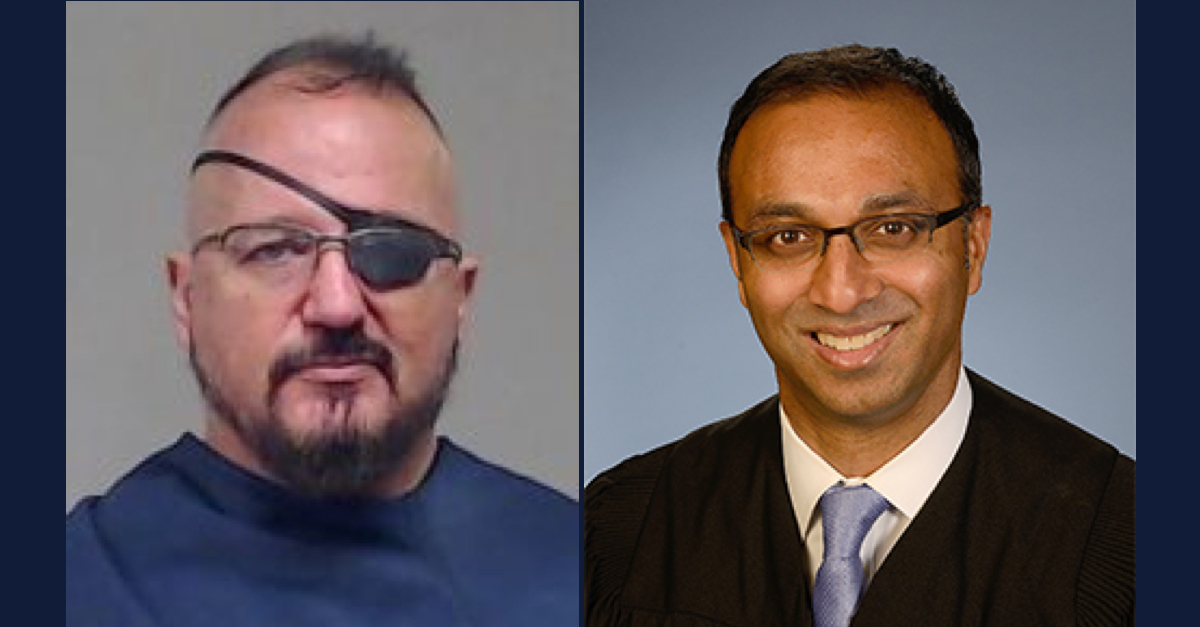
Left: Stewart Rhodes, via Collin County (Tex.) Jail. Right: U.S. District Judge Amit Mehta, via U.S. District Court for the District of Columbia.
The federal judge overseeing the high-profile trial of several members of the right-wing Oath Keepers militia group has rejected the defendants’ latest effort to get the case moved out of Washington, D.C.
Five members of the group — including founder Stewart Rhodes — are facing charges of seditious conspiracy and obstruction in connection with the Jan. 6 attack on the U.S. Capitol. Rhodes and co-defendants Thomas Caldwell, Kelly Meggs, Kenneth Harrelson, and Jessica Watkins are accused of organizing a “Quick Reaction Force” that planned to ferry weapons across the Potomac River to the Capitol in support of Donald Trump, who had exhorted his followers to march to the Capitol in opposition to Congress’ certification of Joe Biden’s win in the 2020 presidential election.
The Rhodes defendants are the first group out of 11 charged in the case; Roberto Minuta, Joseph Hackett, David Moerschel, and Edward Vallejo have a November trial date. Co-defendants Joshua James and Brian Ulrich have previously pleaded guilty to seditious conspiracy in exchange with cooperating with the government.
Before jury selection could get underway Tuesday, U.S. District Judge Amit Mehta had to resolve issues that had come before the court in recent days.
On Friday, attorneys for Rhodes, Caldwell, Meggs, Harrelson, and Watkins filed a motion to move the case out of Washington, alleging “prejudgment bias” on behalf of potential members of the jury, before they could be fully screened and selected. That move came after a pretrial conference Thursday in which Mehta agreed to remove some jurors for cause — including potential bias — but deciding to press other jurors further in order to determine whether they could fairly evaluate the case.
As with numerous similar motions on the Jan. 6th docket, the Oath Keepers’ last-ditch bid for a transfer fell flat. Judge Mehta, as he had done before, rejected the request. The judge went through a painstaking analysis of the juror questionnaires, parsing out which jurors so far have been eliminated for various reasons — including bias, but also for reasons of personal health and unavailability — ultimately determining that the assertion that the majority of potential D.C. jurors are biased against the defendants was not supported by the actual numbers.
Mehta similarly dismissed the defense position that the federal government’s record of acquittals in Jan. 6 jury trials is evidence of bias, implying instead that it’s more likely a matter of the strength of the government’s cases.
The defendants had also argued that news coverage of the case had saturated the District of Columbia, making it next to impossible to find enough jurors who could be fair and impartial when reviewing the case. Mehta rejected this as well, noting what he called a “fundamental” problem with the motion: that the television and radio media markets in Virginia, where the defendants proposed the trial be held, is exactly the same as in Washington.
In a separate motion, the defendants also had asked Mehta to reconsider allowing certain statements made on a Zello chat that he had previously ruled could be admitted. Mehta briefly allowed Caldwell attorney David Fischer to address some potential statements, but quickly pivoted once it appeared that it would take longer than the judge originally anticipated, and decided to hold off on hearing more about the issue until after some headway had been made with jury selection.
Mehta did grant one defendant’s request: Caldwell had asked for permission to go outside of Clarke and Frederick counties in Virginia in order to attend church services. Prosecutors had not opposed the request, which Mehta had granted in a written order on Monday night.
[Image of Rhodes via Collin County (Tex.) jail. Image of Mehta via U.S. District Court for the District of Columbia.]